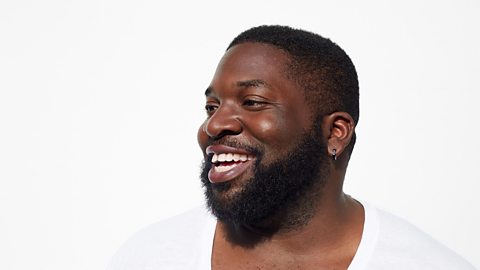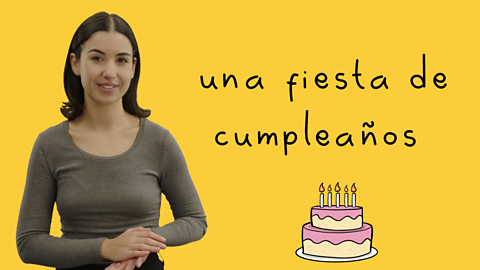Describing people in Spanish.
When you’re describing how you or other people look or are then ser - the verb ‘to be’ is a good place to start.
Soy - I am.
Es - he/she is.
You don’t need to include ‘I, you, he/she’ because the verb tells you who or what it’s about.
Soy alto - I am tall.
Es pequeña - she is small.
Soy deportivo - I am sporty.
Es simp√°tica - she is nice.
It’s also good to be able to say what people have.
Tener - to have.
Tengo - I have.
Tiene - she has.
Tengo el pelo largo - I have long hair.
Tiene los ojos verdes - she has green eyes.
You can say what you wear using llevar - to wear.
Llevo - I wear.
Lleva - she wears.
Llevo gafas - I wear glasses.
Lleva un hiyab - she wears a hijab.
With ser (to be), tener (to have) and llevar (to wear) you can say a lot about yourself or other people!
Describing physical appearance
It is useful to be able to describe what you or someone else looks like physically.
To find out from someone what they look like, ask ¬ø∞‰√≥≥楫 eres? (What do you look like?)
To reply, use the relevant part of the verb ser (to be).
You can see the verb ser in the table below.
| Spanish | English |
|---|---|
| soy | I am |
| eres | you are (s) |
| es | he/she/it is |
| somos | we are |
| sois | you are (pl) |
| son | they are |

A verb is a doing word or an action, for example ‘play’, ‘run’, ‘read’.
Apart from the verb ser (to be), you need adjectives to describe what somebody looks like.
For example:
¬ø∞‰√≥≥楫 eres? - What do you look like?
Soy alto - I am tall.
Notice that alt_o_ ends in o.
Since -o is usually the masculine ending for adjectives in Spanish, this tells us that the person answering the question is male.
¬ø∞‰√≥≥楫 eres?
What do you look like?
Soy alto.
I am tall.

An adjective is a word that describes people, places or things.
Make sure you use es to describe somebody else.
For example:
¬ø∞‰√≥≥楫 es tu madre? - What is your mum like?
Es baja - She is short.
¬ø∞‰√≥≥楫 es tu madre?
What is your mum like?
Es baja.
She is short.
Can you use the language in this table to describe yourself and other family members?
| Spanish | English |
|---|---|
| ¬ø∞‰√≥≥楫 eres? | What do you look like? |
| ≥ߥ«≤‚‚Ķ | I am‚Ķ |
| ¬ø∞‰√≥≥楫 es tu hermana? | What does your sister look like? |
| ∑°≤ı‚Ķ | He/She is‚Ķ |
| alto/a | tall |
| bajo/a | short |

Adjectives always need to agree with the person being described.

Describing hair
To ask someone what their hair is like ask ¬ø∞‰√≥≥楫 es tu pelo?
Use the verb tener (to have) to reply.
You can see the verb tener in the table below.
| Spanish | English |
|---|---|
| tengo | I have |
| tienes | you have (s) |
| tiene | he/she/it has |
| tenemos | we have |
| ≥Ÿ±≤‘√©æ±≤ı | you have (pl) |
| tienen | they have |
Use tengo to describe your own hair.
For example:
¬ø∞‰√≥≥楫 es tu pelo? - What is your hair like?
Tengo el pelo largo y rubio - I have long, blonde hair.
Use tiene to describe someone else’s hair.
For example:
Tu hermana, ¿cómo tiene el pelo? - What is your sister's hair like?
Tiene el pelo corto, liso y negro - She has short, straight, black hair.
Tu hermana, ¿cómo tiene el pelo?
What is your sister´s hair like?
Tiene el pelo corto, liso y negro.
She has short, straight, black hair.

The word for hair (el pelo) is masculine and singular, so the adjectives to describe hair must agree with the word pelo by also being masculine and singular and not with the person you are describing.

Look at the language in this table and use it to help you describe your own hair in detail, or someone else’s hair.
| Spanish | English |
|---|---|
| ¬ø∞‰√≥≥楫 tienes el pelo? | What is your hair like? |
| Tengo el pelo… | I have … hair |
| ¬ø∞‰√≥≥楫 tiene el pelo? | What is his/her hair like? |
| Tiene el pelo… | He/She has … hair |
| corto | short |
| largo | long |
| rizado | curly |
| ondulado | wavy |
| liso | straight |
| negro | black |
| rubio | blonde |
| ≥¶≤π≤ı≥Ÿ≤π√±¥« | brown |
| gris | grey |
| pelirrojo | red |
Describing eyes
To ask someone what their eyes are like you can say:
- ¬ø∞‰√≥≥楫 son tus ojos? - What are your eyes like?
For example:
¬ø∞‰√≥≥楫 son tus ojos? - What are your eyes like?
Tengo los ojos azules - I have blue eyes.
¬ø∞‰√≥≥楫 tienes los ojos?
What are your eyes like?
Tengo los ojos azules.
I have blue eyes.
Use tiene to describe someone else’s eyes.
For example:
Tu hermano, ¿cómo tiene los ojos? - What are your brother’s eyes like?
Tiene los ojos verdes - He has green eyes.
The word for eyes (los ojos) is masculine and plural, so the adjectives to describe eyes must also be masculine and plural.
Notice that there are the two different words for brown:
≥æ≤π∞˘∞˘√≥≤‘
≥¶≤π≤ı≥Ÿ≤π√±¥«
Use marrones when talking about eye colour and ≥¶≤π≤ı≥Ÿ≤π√±¥« when talking about hair colour.
For example:
Mi hermana tiene los ojos marrones - My sister has brown eyes.
Tengo el pelo ≥¶≤π≤ı≥Ÿ≤π√±¥« - I have brown hair.
Talking about other features
To describe other physical features, like being bald, having freckles or wearing glasses you can use the verbs ser (to be), tener (to have) and llevar (to wear).
This is the verb llevar:
| Spanish | English |
|---|---|
| llevo | I wear |
| llevas | you wear(s) |
| lleva | he/she/it wears |
| llevamos | we wear |
| ±Ù±Ù±±π√°æ±≤ı | you wear (pl) |
| llevan | they wear |
For example:
¬øLlevas gafas? - Do you wear glasses?
No, no llevo gafas - No, I don't wear glasses.
Mi madre lleva gafas y un hiyab - My mother wears glasses and a hijab.
Mi abuelo lleva barba y bigote - My grandfather has a beard and a moustache.
Mi padre es calvo - My father is bald.
Tengo pecas - I have freckles.
Use the table below to create a detailed description of yourself and someone else that you know.
| Spanish | English |
|---|---|
| llevo gafas | I wear glasses |
| llevo barba | I have a beard |
| llevo bigote | I have a moustache |
| soy calvo | I am bald |
| llevo un hiyab | I wear a hijab |
| tengo pecas | I have freckles |
| lleva gafas | he/she wears glasses |
| lleva barba | he has a beard |
| lleva bigote | he has a moustache |
| lleva un hiyab | she wears a hijab |
| es calvo | he is bald |
| tiene pecas | he/she has freckles |

Image caption, Mi hermano lleva barba - my brother has a beard
1 of 5
Listen to these two people describe what they look like.
Don't forget to click on the Audio Transcript for the translation!
Tengo el pelo largo, rubio y ondulado. Tengo los ojos azules. Llevo gafas.
I have long, blonde, curly hair. I have blue eyes. I wear glasses.
Tengo el pelo corto, ≥¶≤π≤ı≥Ÿ≤π√±¥« y liso. Tengo los ojos marrones. Tengo barba pero no tengo pecas.
I have short, brown, straight hair. I have brown eyes. I have a beard but I do not have freckles.
Read Tom and Nat's descriptions of themselves and complete the activity.
Tom: Tengo el pelo largo y ≥¶≤π≤ı≥Ÿ≤π√±¥«. No llevo barba. Tengo los ojos azules.
Nat: Tengo el pelo rubio y ondulado. Llevo gafas. No tengo pecas.
Describing personality
To describe someone’s personality, use the verb ser (to be) and different adjectives.
Make sure that adjectives agree with the person that they are describing.
For example:
Me llamo María. Soy inteligente y simpática - I am called María. I am clever and kind.
Mi mejor amigo es hablador pero creativo - My best friend is chatty but creative.
Remember that adjectives that end in -e are the same in the masculine and feminine forms.
For example:
- Mi primo es activo y amabl_e_ - My cousin is active and nice.
Use the tables below to describe your personality and the personality of someone that you know.
Don’t forget to use the correct form of the adjective for the person you are describing.
| Spanish | English |
|---|---|
| ¬ø∞‰√≥≥楫 es tu personalidad? | What sort of person are you? |
| ≥ߥ«≤‚‚Ķ | I am‚Ķ |
| ¬ø∞‰√≥≥楫 es tu hermano/tu hermana? | What sort of person is your brother/your sister? |
| ∑°≤ı‚Ķ | He/She is‚Ķ |
| Es simp√°tico | He is friendly |
| Es simp√°tica | She is friendly |
| Es generoso | He is generous |
| Es generosa | She is generous |
| Es gracioso | He is funny |
| Es graciosa | She is funny |
| Es honesto | He is honest |
| Es honesta | She is honest |
Have a look at this downloadable vocabulary list to see more words to describe people

You could also add intensifiers before the adjective to enhance your language.
For example:
Mi hermano es muy creativo - My brother is very creative.
Mi madre es un poco estricta - My mother is a bit strict.
Can you use these intensifiers to describe different people’s personalities in more detail?
| Spanish | English |
|---|---|
| muy | very |
| un poco | a bit |
| bastante | quite |
| demasiado | too |
If you want to compare two things, you can use ≥æ√°≤ı (more), followed by an adjective and que (than) followed by a noun.
The adjective still needs to agree with whatever is being described.
For example:
- Mi hermana es ≥æ√°≤ı alta que mi hermano - My sister is taller than my brother.
- Mi madre es ≥æ√°≤ı inteligente que mi padre - My mother is more intelligent than my father.
- Soy ≥æ√°≤ı bajo que mi hermana - I am shorter than my sister.
Quiz
Watch the video and test your understanding of describing people in Spanish in this short quiz!
More on Topics
Find out more by working through a topic
- count4 of 10

- count5 of 10
